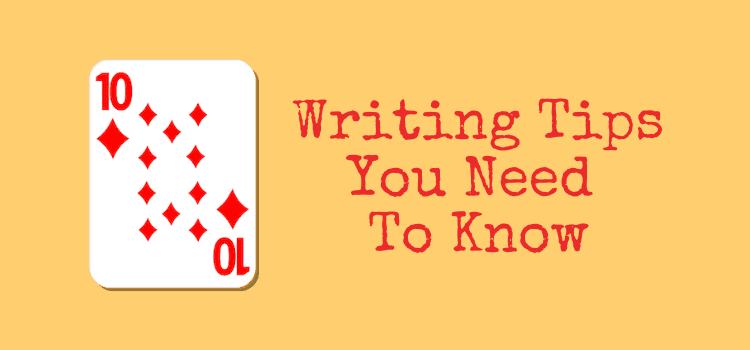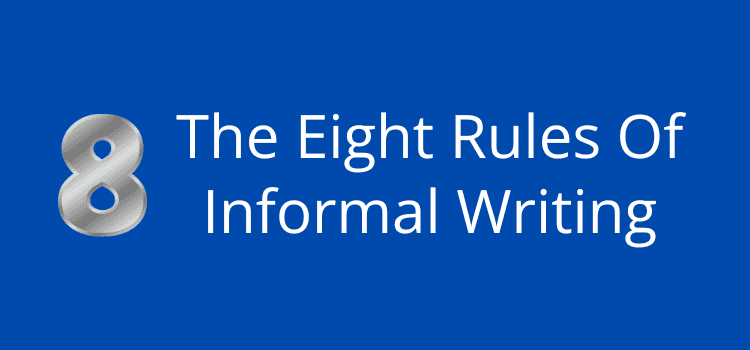
The best writing advice for any new writer is always about getting the basics right and learning how to write well.
These apply to all types of writing and publishing.
It doesn’t matter if you write a book, an article, an essay, or a blog post.
You need to use the same basic writing skills.
Learn how to write well
There are almost endless literary devices and style elements involved in the writing craft.
Consider the writing styles of great writers like Stephen King, Ray Bradbury, J K Rowling, and back to Oscar Wilde, Ernest Hemingway, and Mark Twain.
But as diverse as these writers are in style, they all apply the same fundamentals.
The art of writing is often about simplicity and selective word choices.
But don’t worry. It isn’t difficult to get the basics right.
When you start writing, it is easy to think that all your words will come naturally.
It can be true to some degree.
But good writing is when you take your flow of words and pay attention to some simple writing techniques and structures.
When you start to get them right, you’ll find that your writing will improve immediately.
Then, once you’ve learned to apply these tips by habit, you’ll be on your way to your writing career.
Ten writing tips for new writers
I could write a very long list for you, but I’m not writing a good book here.
So I will limit my hard-learned writing advice and tips to only ten.
I believe these are the ten essential writing tips for any new writer.
1. Always use the active voice
My number one tip for new writers is always to avoid using the passive voice.
Active sentences keep your readers interested.
Passive sentences send them to sleep.
The problem is that the passive doesn’t allow you to say who did or does something.
Then there is no way to explain how, why, when, or where something happens.
If you are not sure how to change passive to active, use a reliable passive checker to help you.
Whenever I have helped new writers with basic editing, this is always the number one writing flaw.
There is only one exception to the rule.
It is when you are referring to someone’s date of birth. Charlie was born in 1972.
For all forms of writing, you should always try to change passive to active voice.
2. Know your point of view
You need to choose the right point of view for any type of writing.
Always decide on your point of view before you write your first word. Otherwise, your writing will be aimless.
In fiction writing, you usually use the third person or the third person omniscient.
These two points of view tell the reader the story from the viewpoint of the narrator or a character.
For a great article or blog writing, the second person is a better choice. You are then speaking directly to your reader.
Writing in the first person is often one of the most obvious mistakes new writers make.
The only use for writing in the first-person narrative would be for a personal memoir or autobiography. It is also possible to write in the plural using the fourth-person POV, but it is rare.
Finally, never mix your points of view. It will completely confuse your readers.
3. Use strong verbs instead of adding weak adverbs
As Stephen King said, referring to adverbs, one dandelion is pretty. Lots of them are weeds.
It is always better to use a strong verb to replace a weak one that uses an adverb.
He walked slowly into the saloon. Bad
He ambled into the saloon. Better
“Get out of my life,” she said loudly. Bad
“Get out of my life,” she shouted. Better
Whenever you see that you are using an adverb to say how something happens, always consider using a better and stronger verb instead.
4. Brush up on your grammar and punctuation
It’s been a while since you were in high school. So take the time for a little refresher to improve your writing.
You don’t need to know all the grammar rules.
But understanding the most common grammar mistakes will help you write much better.
Your tense agreement and the use of commas with but are probably two that can cause you problems.
Who said that writing is easy? Wrong
Who said that writing was easy? Correct
The restaurant was wonderful, but very expensive. Incorrect
The restaurant was wonderful but very expensive. Correct
5. Delete worthless tic words
We all have fluff words that fly from our fingers when we write.
Examples of words to avoid are very, quite, rather, and just.
Mark Twain said this about these types of words.
“Substitute damn every time you’re inclined to write very; your editor will delete it, and the writing will be just as it should be.”
Keep an eye open for weak words that you use by habit in your writing and consider changing or deleting them.
6. Don’t repeat yourself
When you use the same words over and over again, it is called redundancy in writing.
If you keep using the words again and again, your readers are going to get bored.
Avoid using the same words again, again, and again.
If you are writing a book, it can be challenging to find your repeated words and expressions.
An easy way to counter this problem is to use a good writing tool checker to find your repetitions.
You’ll be surprised how often you use the same words and phrases in a long manuscript.
7. Keep it simple
Yes, you know how to write complex sentences, which use multiple clauses that are joined together by relative pronouns and can seem like they might make you look like a writer who knows how to construct sentences that will impress readers intuitively.
Short sentences are usually better because they are much easier to read and understand.
It doesn’t mean that you have to lower the level of your story idea or writing. All you need to do is write naturally but in a way that readers can understand.
Keep one sentence to one thought and one paragraph to one topic.
8. Don’t spend all your five-dollar words
Use fifty-cent words instead.
You have a vast vocabulary, but trying to show it off in every sentence will only serve to discombobulate ($5) your readers.
If you confuse ($0.50) your readers, they will lose interest in a hurry.
Continually using big words when there are better alternatives is rebarbative ($5). Or, in other words, it’s irritating. ($0.50)
9. Long paragraphs are out
If you are writing articles, blog posts, or ebooks, keep your paragraphs short.
Any form of online or screen reading is difficult when your text is in huge blocks.
The best guide now is to limit a paragraph to one or two sentences or four to five lines.
When you read online newspapers, magazines, and blogs now, you can see how this works. Screen readers need plenty of white space to be able to read efficiently.
Don’t try to cram your writing into chunky paragraphs. Keep your text open and easy to read.
10. Do you have to write every day?
You have probably read a lot of advice about keeping up a daily writing schedule or habit.
If your life allows you to do this, well, that’s fine. Tackle the blank page every day.
But unless you are a young writer, you probably have a job, a family, and many other responsibilities.
It is not always possible to set aside the time to write every day.
It is easy for me. I have two jobs, writing, and teaching. So writing every day is part of my professional life.
But I need a break from work like anyone else. Weekends are my downtime when I avoid the keyboard.
If you want to be a writer, don’t try to add hours to an already busy day. Writing when you are tired or stressed can only result in poor output.
It is better to set aside specific times in your week when you know you will be relaxed, fresh, and ready to write.
It could be on the weekend when you are commuting to work or even during your lunch break. If you are an early bird, you might find a few mornings a week works for you.
You don’t need to write every single day. But you should write regularly to refine your craft.
If you plan on writing a book, try writing short stories to help you hone your writing.
Summary
As far as writing tips are concerned, there are no golden rules to obey if you want to become a writer.
Take your time, read writing advice articles like this, and then make your way forward.
All I can say in closing is that clarity and having something important to say are the two most vital ingredients in good writing.
Get those two elements right, and you are on your way to being a great writer.
Related reading: Using Freewriting To Help You Become A Much Better Writer
Share This Article



Interesting and informative
As a journalist, the tips may seem very basic, but serve as a good reminder! Well written.., especially the $5 word bit.. we have a propensity to capitulate to the temptation to utilise rhetorical vocabulary (how many dollars there!?)